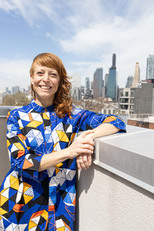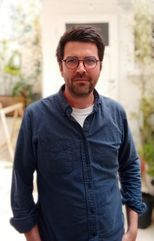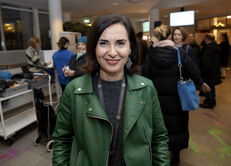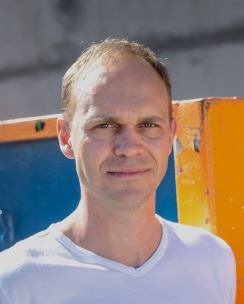
Keynote speakersKeynote SpeakersRosalind Fredericks
Rosalind Fredericks is an Associate Professor of Geography and Development Studies at the Gallatin School of Individualized Study at New York University. Fredericks's research and teaching interests are centered on development, urbanism, and political ecology in Africa. As an urban geographer, her research brings together discard studies, critical infrastructure studies, and feminist political ecology in examining the politics of waste work and discard infrastructures in Dakar, Senegal. Her book, Garbage Citizenship: Vital Infrastructures of Labor in Dakar, Senegal (Duke University Press, 2018), was awarded the Toyin Falola Book Award for the best book in African Studies by the Association of Global South Studies. Her current research project, supported by a major grant from the National Science Foundation, examines the lifeworlds that hang in the balance with the transformation of Dakar’s dump, Mbeubeuss. This research is the basis of her book manuscript, tentatively titled Refuse(al), and her recently released documentary film, The Waste Commons, in collaboration with Alchemy Films. After completing her PhD in geography at the University of California, Berkeley, Fredericks was a postdoctoral research scholar with the Committee on Global Thought at Columbia University. Fredericks edited two books with Mamadou Diouf on citizenship in African cities: Les arts de la citoyenneté au Sénégal: Espaces contestés et civilités urbaines (Editions Karthala, 2013) and The Arts of Citizenship in African Cities: Infrastructures and Spaces of Belonging (Palgrave MacMillan, 2014) as well as The Politics of Disposability: Discard Studies in an Era of Devaluation with Mohammed Rafi Arefin (exp. 2025). Fredericks is the co-director (with Robin Nagle) of the Discard Studies Collaborative at NYU and co-organizer of the Discard Studies Conference held at Gallatin in September 2022 and the Discard Studies Film Festival in April 2024. She is serving as an NYU Center for the Humanities Fellow for 2024-2025.
Mary Lawhon
Mary Lawhon is Professor of Political Ecology at the University of Edinburgh. She is interested in what waste tells us about broader understandings of justice and sustainability. Her early scholarship focused on conflict between actors over how to improve recycling, showing multiple answers to the questions of ‘what should be done’ and ‘what sustainability might look like’. These different versions of what improved recycling infrastructure might entail were deeply entangled with questions about who would decide, who had power, and who would benefit from new material flows.
Baptiste Monsaingeon
Lecturer at the University of Reims Champagne-Ardenne, researcher at the CRIEG-REGARDS laboratory, on delegation to the ESO laboratory (CNRS), Baptiste Monsaingeon studies the place of waste, particularly plastics, in our societies. Maria Jose Zapata Campos
María José Zapata Campos is an Associate Professor at the School of Business, Economics and Law at the University of Gothenburg and Research Director at the Swedish International Centre for Local Democracy. Her research, conducted collectively with an inter- and transdisciplinary team and from a waste-activism perspective, explores the organizing of grassroots initiatives for sustainability, particularly at the intersections of waste and climate governance in cities. From Managua’s dump site to informal settlements in Kisumu, Kenya, from coastal plastic pollution in Mombasa to circular grassroots initiatives in Sweden, María José has examined how community-led innovations contribute to just transitions. Her work highlights how grassroots challenge dominant systems, help us reimagine waste and democracy, and build alternative infrastructures of care in post-growth cities.
Sylvie Ayimpam
Sylvie Ayimpam is an anthropologist with a doctorate in political and social sciences from the Catholic University of Louvain. She is a lecturer (ATER) at Aix Marseille University and a researcher at the Institut des mondes africains (IMAf). Her research combines socio-anthropology and socio-economics, with fieldwork in Central and West Africa. She is interested in informal economic practices and forms of informal regulation. Her recent work focuses on the economy of leftovers and recycling, the transnational circulation of second-hand goods (particularly textile scraps), and risk management in urban markets. She also analyses digital uses in informal economies. She is the author of Économie de la débrouille à Kinshasa (Karthala, 2014). She is currently preparing a thematic dossier on the economy of leftovers and recycling in the South for the International Journal of Development Studies. She is a member of the Déchets, valeur et sociétés thematic network.
Daniel Sosna
Daniel Sosna is a researcher at the Institute of Ethnology, Czech Academy of Sciences in Prague. His work focuses on the economics and politics of waste, the ethics of discard practices, multispecies relations with waste, and resource use. He earned his PhD in anthropology from Florida State University in 2007. Daniel’s early research interests included mortuary practices and social organization in past societies. This eventually led him to an interest in garbology and ethnography. His studies involving landfill workers and waste pickers prompted him to investigate the forms of living in the disappearing world of contemporary landfills in Central Europe. Daniel has taught anthropology and archaeology at the University of West Bohemia, Charles University, Florida State University, and Masaryk University.
|







